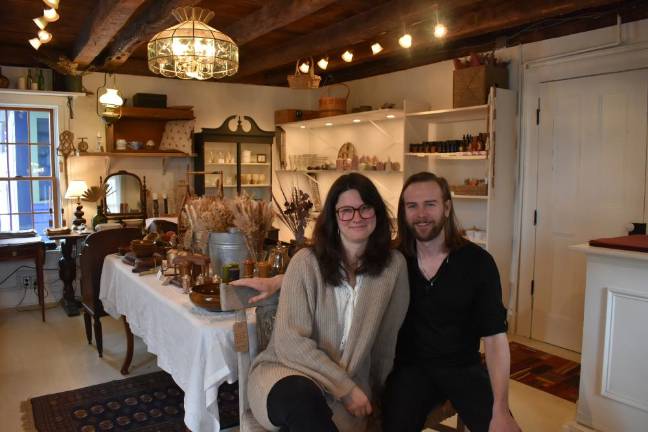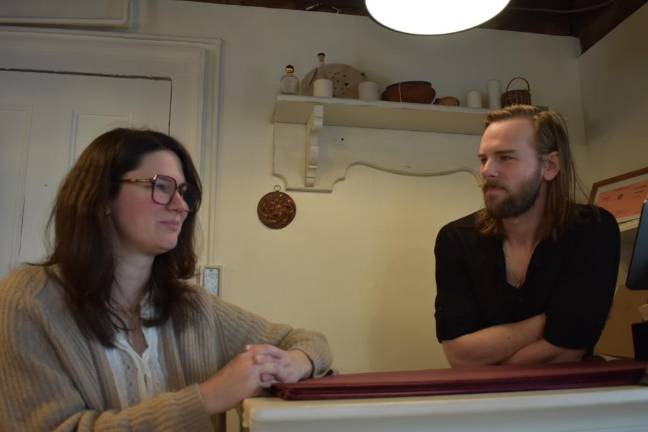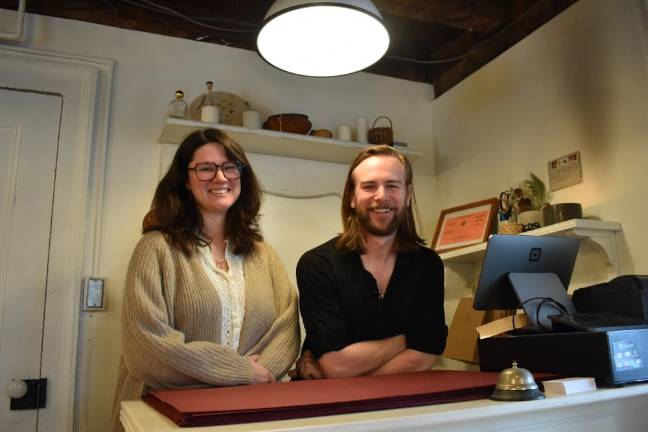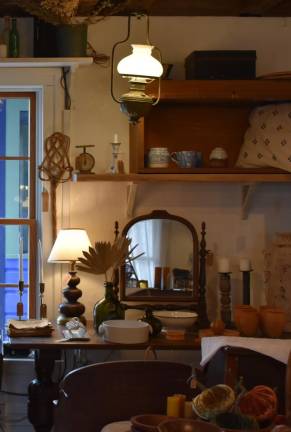Antiques past and future
‘We saw this house, and we kind of fell in love. And it just happened to come with a shop, so we thought, Okay, let’s do this’




The morning we meet in Sugar Loaf, NY marks nine years to the day that Melanie Durand noticed Tim Brown busking in the Union Square subway station. She was on a whirlwind trip from her native France with a friend, awaiting a delayed subway, when she stopped short to take in the three-man Americana folk band – particularly, perhaps, the fiddler – playing a style of music she’d never heard.
Fast forward through a long distance romance, a Covid-era move from Brooklyn and a search for a place to call home, and here we are. The Browns, both 34, are living above their new shop, Cachet Home Market, in a bright blue, pre-Revolutionary War house on the main drag of the artisan village of Sugar Loaf – which is actually somewhat like the tiny town where Melanie grew up, three hours south of Paris.
“We saw this house, and we kind of fell in love. And it just happened to come with a shop, so we thought okay, let’s do this,” said Melanie. They’ve converted their dining room into a space for making many of the artisanal goods – pinch pot candles, beard balm, sculptural candles, concrete candleholders and vases – that are on offer downstairs, alongside a curated assortment of antiques.
Melanie has signed on as the secretary of the Sugar Loaf Chamber of Commerce. Tim is secretary of the Sugar Loaf Community Foundation. “We have been working really hard at bringing Sugar Loaf back. We have the spring festival coming back at the beginning of May,” said Melanie. “So many people come by and say ‘Oh, it used to be, it used to be, it used to be.’ And we’re like, ‘Well now it’s something else, and it’s going to be great.’”
“Sugar Loaf has always been about the individual human beings who create their art,” said Tim, “and so it’s going to be ever-evolving. We want it to reflect who’s here now and we want to encourage makers to come enjoy the community and sort of enliven it again.”
It was a leap of faith for Melanie, a graphic designer, and Tim, a Georgia-born musician and actor, to go all-in on a brick-and-mortar shop in the age of one-click shopping. “I feel like that’s sort of how we’ve lived our lives since we met each other,” said Tim. “We see an opportunity, we see something that you know, we love, and we decide to put value on it and to not look back.”
Melanie quit her career of 11 years, designing packaging for luxury spirits and cosmetics, to pour her creativity into this venture. It was a move she’d been longing to make. “The desire for freedom was really strong,” she said. “And then when there was an opportunity to be your own boss and open a shop, it was like – yeah, absolutely, we’re doing that.” Tim still travels to play fiddle with his band, The Good Morning Nags, which has grown in size and stature, leaving its busking days behind.
What was it that made them settle here, instead of Westchester or Rockland County, where they’d also been looking? “The house itself, it has character. It has a personality of its own, no matter how it’s designed,” said Tim. “It’s something that actually really inspired us with the shop itself, is the idea of carrying on heirlooms,” said Tim. “To take what you’ve inherited and gained over time, and then to start anew as well, and create your own heirlooms for the future. That there’s no need for them to be separate in any way. It’s all about creating our own history, sort of continued history, and seeing how that blends together.”
The blending of eras is not just a figurative process; it’s quite literal, too. The previous owners, Yaron and Kiki Rosner, made soap here for decades, and that too has become part of the house’s story. “Because of the Rosners, there’s literally soap in the wood. We can’t smell it anymore, but if we go away for a little bit and come back, we can still smell it a little bit,” said Tim.
“All throughout the house is a very particular smell,” said Melanie. “It’s of soap, and firewood – because there’s a wood stove in the back – and it kind of blends with the wooden beams.”
Those beams feel like home to Melanie. As a child, she slept in a lofted room among beams like these – “like trunks of oaks,” as she says – in her family’s ancient limestone house, whose foundation dates back to the 16th century.
The concept of an antique shop, which was in many ways a hard left turn for the couple, also felt a bit like home to Melanie. Her grandmother ran a by-appointment antique shop out of her house back in the Durands’ hometown, L’Ile Bouchard in the Loire Valley. A predilection for antiques and interior design has made its way down through the family bloodline. The Durands are, in fact, working on getting together a container of French antiques to ship to their daughter and son-in-law.
Tim came up with the name Cachet, which we use to mean flair, but translates literally to “stamp” or “mark.” It works on multiple fronts: as a subtle double entendre about making your mark with style; as a nod to Melanie’s heritage; and as a shortish word most Americans can pronounce. Although sometimes people call the store “Catch it,” said Tim.
“Which I like, too,” said Melanie, unbothered.
Less than a year in, Cachet’s reception has been enthusiastic. “A lot of people tell us ‘Oh, Sugar Loaf needed something like that,’” said Melanie. As with many of the little shops in Sugar Loaf, you feel the moment you walk in that the store is not just a place of commerce, but something more intimate: an extension of the owners themselves.
“I think we’re sort of moving into a lifestyle brand in a way,” said Tim. “We’re trying to share our ideals, our vision, rather than throwing a bunch of junk in a store and putting a price tag on it,” said Tim.
“Even if it’s nice stuff,” said Melanie, expanding on his thought. When they source things from other makers, “we try to make sure they’re ethical, whether it’s U.S. made or women-owned or Fair Trade,” she said.
It’s daunting to attempt to explain your personal aesthetics into a coherent theory, but when pressed, they are game to try. “We always come back to this conversation, but I think basically we like to bring heirlooms, whether it’s furniture, or an object that is going to last and that is made for living,” said Melanie. “We say we carry curated gifts, but we’re not into the idea that your house has to be curated. Like, you have to love your house and then give it gifts, basically. And just make it this collection over time of lived-in goods.”
“There’s no need to save all your nice stuff for the nice time,” riffed Tim. “Use the nice china. Use the really fancy pair of chopsticks to eat the cheap, dollar ramen. Sit on your fancy couch and enjoy it.”
“You deserve the nice things you have. Things are made for living, they’re not just made to be in a museum,” said Melanie. “We like that, bringing beauty into people’s homes – and our home.”
Some people have rolled their eyes at the price tags, probably assuming that the couple are just employees. In a small store, they can’t but hear every criticism, subtle or explicit. “They really don’t hold back sometimes,” Melanie said with a laugh.
We the American consumers have gotten so used to what Amazon and Walmart can do, said Tim, that we’ve all but forgotten about the humans involved in making our everyday necessities. “There’s an unlearning that people have to do,” said Melanie. “It’s more transparent here. We make our stuff ourselves. We break our backs. We, like, cover ourselves in concrete. We’re not just employees of retail, we actually get our hands dirty.”
When the couple first saw the house, it was painted a riot of funky colors. “This wall was red, this was blue, this was yellow,” said Melanie. The first order of business was obvious to both of them. They painted the whole store white – walls, shelves and hardwood floor – a counterbalance to the dark, heavy feel of the wood beams and old pieces, which can sometimes make antique shops feel claustrophobic.
“We wanted the place to be refreshing,” said Tim. “We wanted to bring it back to a place of neutrality, where we could make it our own in the future.”
“We, like, cover ourselves in concrete. We’re not just employees of retail.”